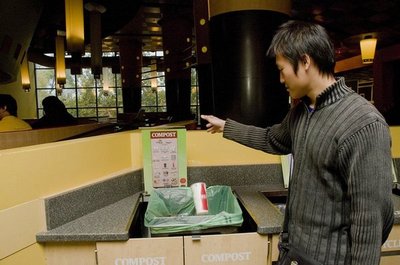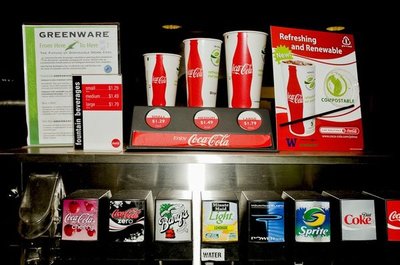October 15, 2009
At last – a soda-cup lid that’s compostable
UW Housing and Food Services is one step closer to reaching its goal of zero-waste with the introduction of the first compostable soda cup lid.
Previously the on-campus community was taught to compost both the straw and cup, but to remove the lid. A compostable soda straw has been used on campus for over two years and a compostable cold-beverage cup has been in use since November of 2008. The lid was the missing link up until last week.
Now when a soda cup is purchased on campus, every piece is compostable–making composting more user-friendly.
“It’s always exciting to keep one more item out of the landfill, but perhaps even more importantly, the lid simplifies and streamlines the composting process,” said Krysta Yousoufian, associate director of Students Expressing Environmental Dedication (SEED).
In the past, many assumed the lid was compostable and tossed the entire soda into the compost bin. The non-compostable lid was the No. 1 contaminant in the UW’s compost.
“Staff used to go through the compost bins at the end of the day taking lids off of soda cups because many made it in the bin. We want to make sure that we send as little contamination as possible to Cedar Grove Composting, which is now easier with the compostable lid,” said HFS Project Manager Micheal Meyering.
SEED also spent much time trying to limit contamination through what they call ‘trash duty.’
“When we did trash duty in the past, we had to tell students, ‘Oh, you can compost your cup, and your straw. But wait, the lid is trash, so first remove that and throw it in one bin, and then put the cup and straw in the other bin.’ It’s really not difficult or time-consuming, but I imagine the extra step is just enough to put off many people. … Basically the easier composting is, the more successful it will be,” said Yousoufian.
The innovative soda lid that makes composting less confusing has been three years in the making.
Meyering said, “It was quite a process to get the lid produced. We have a contract with Coca Cola, so they worked in collaboration with us and International Paper.”
International Paper is a company that produces products in a way that ensures “responsible stewardship of natural resources today and for generations to come” according to its Web site.
“The lid was created carefully and thoughtfully because Coke wanted to make sure it would perform as well, if not better than lids currently on the market before mass producing it,” said Meyering.
Though the new corn-based lid is slightly more complicated to produce, Meyering said, “It’s very comparable to the price of other non-compostable lids because as a large organization we were able to drive down the cost by having companies submit bids for the production. We did that this summer and were able to get a low price.”
UW hopes the use of compostable products will spread to fast food restaurants in the region.
Meyering said, “We have a variety of eating options around campus, which provide models for many styles of restaurants on how to incorporate compostable materials. A place like McDonald’s could use what our burger places use. We have espresso bars and everything from stir-fry to salad bars, all of which use compostable containers.”
In July 2010, businesses will be required by the Seattle City Council to discontinue the use of Styrofoam to-go containers and switch over to either compostable or recyclable containers. HFS believes the UW serves as an example for restaurants on how to successfully switch over to compostable products thanks to innovative ideas such as the Coca Cola lid and the school’s history with composting.
“From June of 2005 through July of 2006, the UW shipped 140 tons of compostable material to Cedar Grove Composting,” said Julie Case, interim communications specialist for HFS. “From July 2007 to June 2008 we shipped 506 tons of compost. And last year we were up another 6.72 percent, or 34 tons—shipping 540 tons of compost to Cedar Grove.”
Meyering said, “We purchase $10 million worth of food and products each year and try to be as sustainable as possible. The UW is continually striving for zero-waste. We will be introducing more compostable products this school year and are encouraging manufacturers of the products we carry in our convenience stores to switch to compostable packaging.”
By late January, all of the hot cup lids used by the HFS espresso bars will be compostable.
“We’ve been waiting for quite awhile for the food packaging industry to develop the technology to produce lids that can handle hot beverages and still be compostable and are very close to having compostable hot cup lids available for all of our espresso bars on campus. We are currently running a pilot of these new compostable hot cup lids at the UW Tower espresso bar,” said Meyering.
A compostable soup cup lid will also be introduced by March.
“At that point, we will be 100 percent compostable in regards to our hot/cold containers, cutlery and napkins on campus,” said Case.


